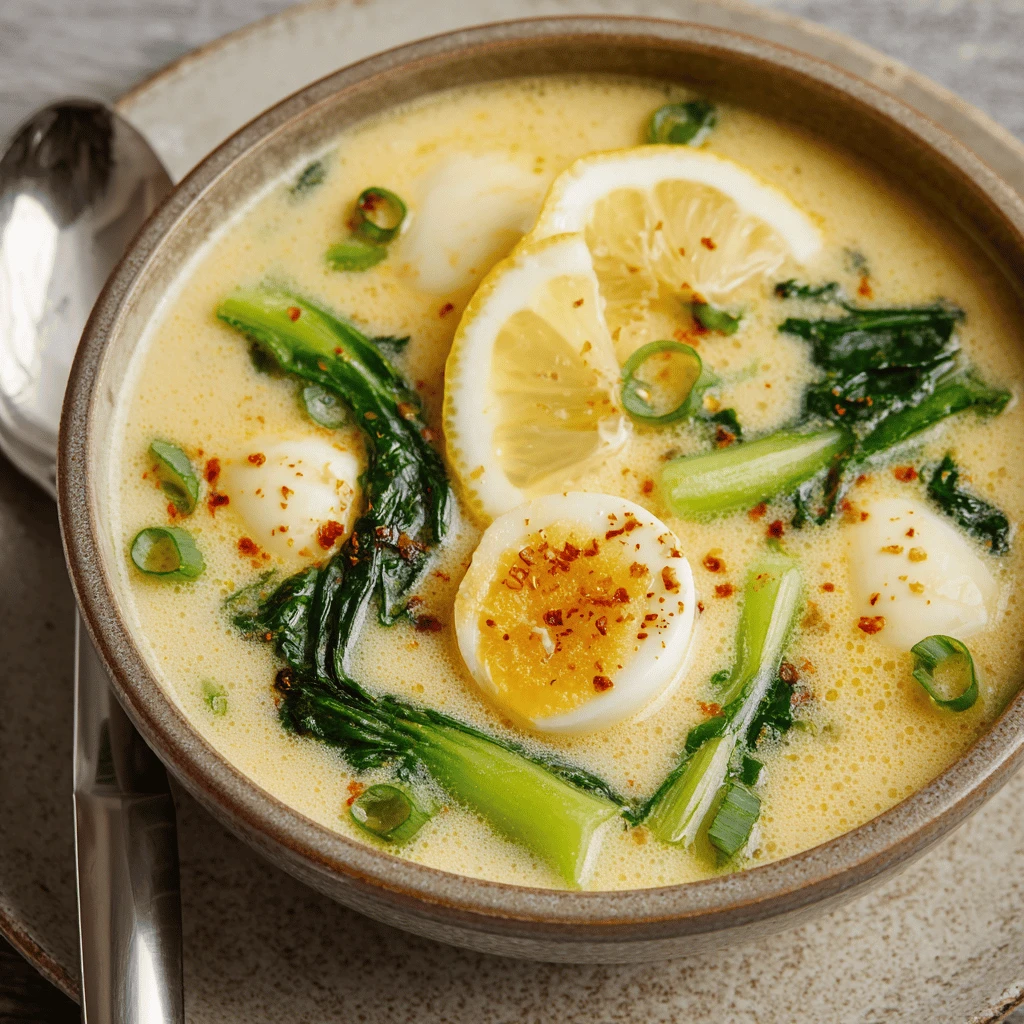Gluten-Free Lemon Egg Soup: A Comforting Classic Reimagined
Lemon egg soup, also known as Avgolemono in Greek cuisine, is a beloved classic known for its creamy texture and bright, citrusy flavor. Typically made with chicken broth, eggs, and lemon juice, it offers a comforting and nourishing experience. However, the traditional recipe often includes pasta or flour as a thickening agent, making it unsuitable for those following a gluten-free diet. This article explores how to create a delicious and authentic gluten-free version of this comforting soup, perfect for anyone looking for a warm, flavorful, and allergy-friendly meal.
Understanding Gluten and Its Role in Traditional Lemon Egg Soup
Gluten, a protein found in wheat, barley, and rye, is responsible for the elastic texture in many foods. In traditional lemon egg soup, flour or small pasta shapes are sometimes used to thicken the broth and add body. For individuals with celiac disease or gluten sensitivity, consuming gluten can trigger adverse reactions. Fortunately, creating a gluten-free lemon egg soup that maintains the desired creamy consistency and flavor is entirely achievable with simple substitutions and techniques.
Crafting the Perfect Gluten-Free Lemon Egg Soup: Ingredients and Techniques
The key to a successful gluten-free lemon egg soup lies in carefully selecting ingredients and employing techniques that ensure a smooth and flavorful result.
Ingredients: The Foundation of Flavor
- Broth: Opt for high-quality chicken broth as the base. Homemade broth is ideal for its depth of flavor, but a good quality store-bought version, clearly labeled gluten-free, will work well. Vegetable broth can also be used for a vegetarian option.
- Eggs: Fresh, high-quality eggs are essential for achieving the desired creamy texture. Use whole eggs for a richer flavor and yolk-only for a bright yellow color.
- Lemon Juice: Freshly squeezed lemon juice is crucial for the characteristic tang of lemon egg soup. Avoid bottled lemon juice, as it often contains preservatives and lacks the vibrant flavor of fresh lemons.
- Starch (Gluten-Free Thickener): Instead of flour, use a gluten-free starch such as cornstarch, tapioca starch, or arrowroot starch to thicken the soup. These starches blend seamlessly into the broth, providing a smooth and velvety texture. A small amount of rice can also be cooked into the soup and pureed, providing a more natural thickening agent.
- Aromatic Vegetables (Optional): Enhance the flavor by including aromatic vegetables such as celery, carrots, and onions. These add depth and complexity to the broth.
- Herbs and Seasonings: Fresh dill is a classic addition to lemon egg soup, providing a bright and herbaceous flavor. Other herbs like parsley or oregano can also be used. Season with salt and pepper to taste.
Techniques: Achieving the Creamy Texture
- Tempering the Eggs: This is the most important step in preventing the eggs from curdling when added to the hot broth. Whisk the eggs with lemon juice in a separate bowl. Gradually add a small amount of hot broth to the egg mixture, whisking constantly, until the mixture is warmed through. This process gently raises the temperature of the eggs, allowing them to blend smoothly into the broth without scrambling.
- Gradual Incorporation: Once the eggs are tempered, slowly pour the egg mixture into the pot of simmering broth, whisking constantly. This ensures even distribution and prevents the eggs from cooking too quickly.
- Low and Slow Simmer: After adding the egg mixture, maintain a very low simmer. Avoid boiling the soup, as this can cause the eggs to separate. Simmer gently for a few minutes, stirring occasionally, until the soup thickens slightly.
- Adjusting the Lemon and Salt: Taste the soup and adjust the lemon juice and salt to your preference. The acidity of the lemon juice can vary, so you may need to add more or less to achieve the desired balance.
Variations and Additions to Elevate Your Gluten-Free Lemon Egg Soup
While the basic recipe for gluten-free lemon egg soup is delicious on its own, there are several variations and additions you can explore to customize the flavor and texture.
- Chicken: Add shredded cooked chicken to the soup for a heartier and more substantial meal. Leftover rotisserie chicken is a convenient option.
- Vegetables: Incorporate other vegetables like spinach, zucchini, or peas for added nutrition and flavor.
- Rice: Add cooked rice, either white or brown, for a comforting and filling element. Avoid wild rice, as it is not always gluten-free. Alternatively, using a little bit of rice flour with the other starches will increase thickening.
- Orzo (Gluten-Free): Look for gluten-free orzo pasta, often made from rice flour, for a traditional touch. Cook the orzo separately according to package directions and add it to the soup just before serving.
- Coconut Milk: For a dairy-free and creamy option, replace some of the chicken broth with coconut milk. This will add a subtle sweetness and richness to the soup.
- Turmeric: A pinch of turmeric can enhance the color and provide anti-inflammatory benefits.
Serving and Storing Your Gluten-Free Lemon Egg Soup
Gluten-free lemon egg soup is best served warm, garnished with fresh dill and a lemon wedge. It can be enjoyed as a light lunch, a comforting dinner, or a soothing remedy for a cold.
Serving Suggestions
- Serve the soup in shallow bowls to showcase its creamy texture and bright color.
- Garnish with a sprig of fresh dill and a lemon wedge for added visual appeal and flavor.
- Pair with a side of gluten-free bread or crackers for dipping.
Storage Instructions
- Allow the soup to cool completely before transferring it to an airtight container.
- Store in the refrigerator for up to 3 days.
- Reheat gently over low heat, stirring occasionally, until warmed through. Avoid boiling, as this can cause the eggs to separate.
- Freezing is not recommended, as the texture of the soup may change upon thawing.
Frequently Asked Questions (FAQ)
- Can I use bottled lemon juice instead of fresh?
While bottled lemon juice is a convenient option, it lacks the vibrant flavor of fresh lemons and often contains preservatives. Freshly squeezed lemon juice is highly recommended for the best flavor.
- How can I prevent the eggs from curdling?
Tempering the eggs is essential to prevent curdling. Gradually add a small amount of hot broth to the egg mixture, whisking constantly, until the mixture is warmed through. This process gently raises the temperature of the eggs, allowing them to blend smoothly into the broth.
- What if I don’t have any gluten-free starch?
You can use pureed rice, potato, or even cooked cauliflower as a natural thickening agent. Blend the cooked ingredient until smooth and stir it into the soup to thicken.
- Can I make this soup ahead of time?
Yes, you can make the broth ahead of time and store it in the refrigerator. However, it's best to add the egg mixture just before serving, as the texture of the soup may change upon standing.
- Is this soup suitable for vegetarians?
Yes, you can easily make a vegetarian version by using vegetable broth instead of chicken broth.




